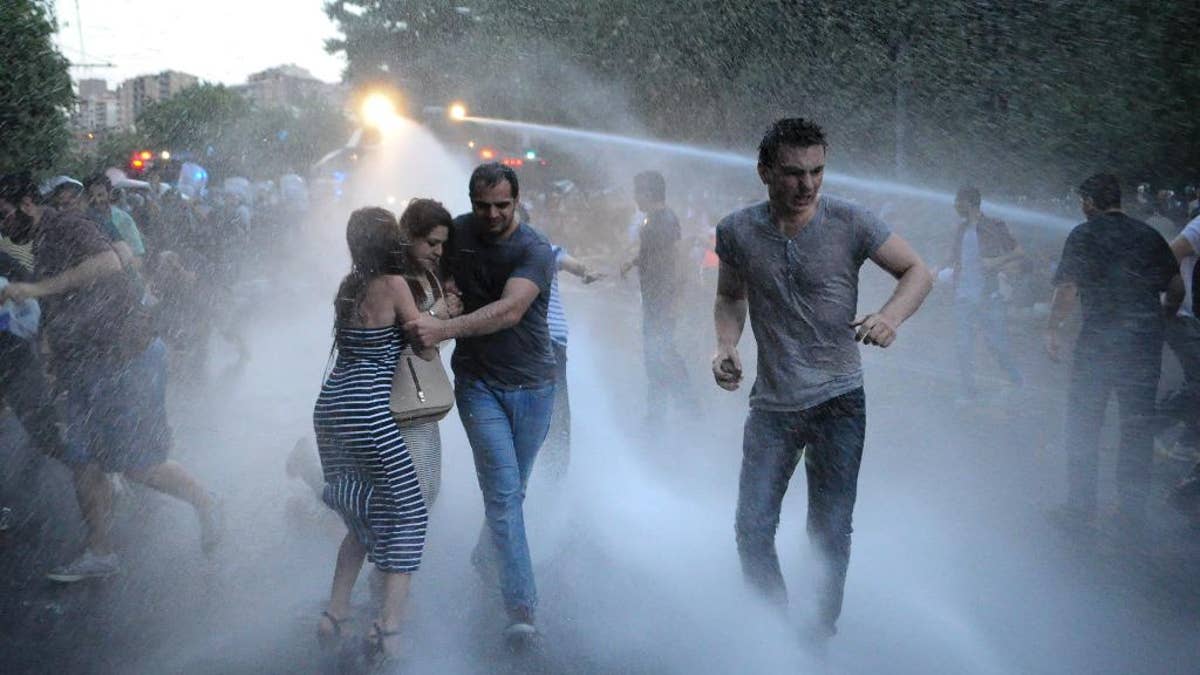
FILE - In this Tuesday, June 23, 2015, file photo, Armenian police use water cannons to disperse protesters demonstrating against an increase in electricity prices in the Armenian capital of Yerevan. The protests are continuing despite the president’s decision to suspend the price rise. (Narek Aleksanyan/PAN Photo via AP, File (The Associated Press)
YEREVAN, Armenia – Street protests in Armenia against a hike in electricity prices, which have been roiling the capital for nearly two weeks, are the most serious unrest the Caucasus nation has seen in years. The protests are continuing despite the president's decision to suspend the price rise.
Armenia is allied closely with Russia, where some fear the protests could follow the pattern of massive demonstrations in Ukraine that swept a pro-Moscow president from power last year. The action organizers, however, describe it as a purely social protest and strongly deny affiliation with any political forces. Here is a look at the main factors in the demonstrations:
PROTEST TACTICS
The organizers have relied on social networks to rally the crowds, and their hashtag #ElectricYerevan quickly became a hit on Twitter.
When police blocked thousands of protesters from marching on the presidential residence, they sat on the capital's main avenue, catching authorities by surprise. After hours of hesitation, police dispersed the rally with the help of water cannons, arresting nearly 240 people, but thousands of protesters flooded back to the area shortly after.
Fearing that the use of force could further fuel unrest, the government backed down and quickly released all those who were arrested. Police have refrained from using force ever since.
Demonstrators have maintained their blockade of the central avenue and also sought to expand their support base by inviting people to protest at home by switching off lights for an hour each day and making noise with their utensils from their balconies.
APOLITICAL ORGANIZERS
The protests have been organized by a group of young professionals, who in the past successfully campaigned against a plan to commercialize downtown streets and a rise in bus ticket prices.
The organizers say they aren't connected to any Armenian or foreign political force and say their goal is to combat official incompetence and corruption draining the country's scarce resources. But Russia, Armenia's economic patron, suspects more sinister influences.
MOSCOW'S SUSPICIONS
Some Russian lawmakers and pro-Kremlin commentators have suspected a Western hand in the protests, alleging that the U.S. and its allies may have a hand in the protest in a bid to pull Armenia away from Russia's orbit amid the showdown over Ukraine.
Demonstrators vehemently deny such claims, which were also aired by Russian state-controlled television stations, seeing them as a sign of Russian paranoia and disrespect for protesters' cause.
The Kremlin, though, has taken a cautious stance, saying that it's up to the Armenian government and protesters to settle the differences in line with the law.
Armenia hosts a Russian military base and is a member of a Moscow-led security grouping. It also has recently joined the Eurasian Economic Union, an economic alliance of ex-Soviet nations seen as a key policy priority by the Kremlin. Russian companies control the most prized Armenian economic assets, including the electricity company.
ELECTRIC MESS
The power grid had asked for a 30-percent price increase, but the government regulatory panel only approved a 17-percent hike. The government argued the increase is long overdue because of a devaluation of the national currency, repairs at Armenia's only operating nuclear reactor and a drop of output at the nation's hydroelectric power plants.
Protesters say that the power grid is tainted by massive corruption. They saw the proposed price increase as an attempt at even more massive pilferage of national wealth.
After a week of demonstrations, President Serzh Sargsyan said the government would suspend the price hike pending an independent audit of the power grid. Russia pledged to provide a new $200-million loan, seen as a tacit way to help shore up the ailing power grid and avoid the price hike. Some protesters saw it as a victory and left, but others stayed, demanding an outright annulment of the price rise.
IMPOVERISHED NATION
The wider context is that landlocked Armenia is one of the poorest of the ex-Soviet nations, weakened by more than two decades of transport and economic blockade imposed by neighboring Turkey in connection with Armenia's conflict with Azerbaijan over the breakaway region of Nagorno-Karabakh. International efforts to negotiate a settlement have failed, and attempts at rapprochement between Armenia and Turkey also have been unsuccessful.
More than one third of Armenia's 3-million population lives below official poverty line, currently equivalent to less than $170 a month. The average montly salary is equivalent to $250.
___
Vladimir Isachenkov in Moscow contributed to this report.
